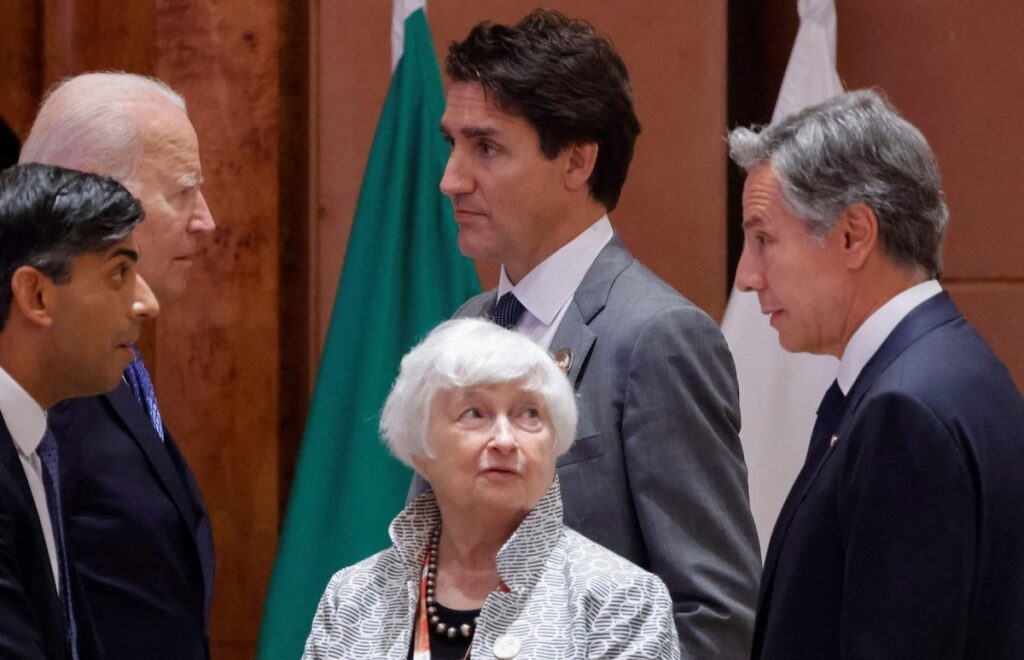Open this photo in gallery:
UK Chancellor Rishi Sunak (left), US Treasury Secretary Janet Yellen (centre), US President Joe Biden (second from left), Canadian Prime Minister Justin Trudeau and US Secretary of State Antony Blinken (right) speak before the start of the second working session of the G20 summit at Bharat Mandapam in New Delhi, September 9, 2023. LUDOVIC MARIN/AFP/Getty Images
Carlo Dade is director of trade and trade infrastructure at the Canada West Foundation and a member of the Mexican Council on Foreign Relations.
Countries may be friendly to one another, but they are not friends.
They are allies and competitors, and Canada has often been roadkill in its global race with the United States for economic opportunity.
Canada needs to keep this in mind as it prepares to once again engage in coordinated negotiating efforts with the United States after the November election and before the review of the United States-Mexico-Canada Agreement (USMCA) in two years.
This roadkill reality has been a constant theme in Canada-U.S. relations since at least the 1950s, when the U.S. punished Canada for violating a grain embargo against China during China’s largest famine, to more recently when the U.S. used the NAFTA renegotiations (which gave birth to the USMCA) to gain an advantage over Canada in agricultural sales to China.
In these cases and others, including the implementation of the U.S. embargo on Cuba, what began as measures to further legitimate U.S. security concerns have morphed, whether intentionally or not, and often with great hypocrisy, into measures that benefit U.S. companies and harm their competitors.
This reality will be exacerbated as the United States expands the scope, intensity, and extraterritorial reach of security measures it employs in its disputes with China. For example, the United States has already signaled that Canada's slow response to what it claims are USMCA-mandated seizures of forced labor products from China will be on the agenda for a future review.
In this extremely challenging security environment, the warm and fuzzy romanticism of friendship needs to be replaced with sober and clear-sighted thinking as part of a comprehensive rethinking of how Canada engages with the U.S. It would also be useful to draw lessons from how Canada has historically managed tensions between its trade and security interests with the U.S.
In the mid-1950s and early 1960s, at the lowest point of modern Canada-US relations, Canada was losing wheat sales worldwide due to US political pressure abroad and subsidies disguised as foreign aid. This caused a sharp decline in income for farmers in the Plains and a crisis ensued. Canadian pleas to Washington were ignored. Around this time, Canada entered the Chinese wheat market, which the US had not entered due to the security embargo on China. Canadian grain sales increased and Washington was furious.
Far from discussing a fairer distribution of the world grain market, the Kennedy administration refused to allow U.S.-based oil companies to refuel grain ships at the port of Vancouver, threatened Canada's auto industry, and at one point suggested the U.S. would give Canada permission to violate the embargo, essentially to approve which Canadian products could be shipped to whom from Canadian ports.
More recently, during the renegotiation of the North American Free Trade Agreement, the United States inserted a clause at the last minute, also for security reasons, that would have prevented a country from negotiating a trade agreement with China. This clause, which allows a country to withdraw from an agreement if it has negotiated one with China, has no new legal or material effect. The right to withdraw for any reason existed in previous treaty versions. But it did have a psychological effect, essentially scaring the Canadian public sector, private sector, media and politicians. However, while Canada was panicking, the United States negotiated and then signed a partial trade agreement with China. This agreement gave certain unique advantages to US agricultural exporters at the expense of Canadian agricultural exporters.
We have seen this happen many times before, so it is impossible not to notice that the United States has used legitimate security concerns to advance its commercial interests as well – during the Cold War, in containing Cuba, and more recently in countering the rise of China.
On security issues, we have always been and will continue to be good allies with the United States. We need to learn to be better competitors without hostility, aggression, or a “Beaver Warrior” approach to economic diplomacy.
We have done so in the past. Whether Canada can regain that clarity in an era of increasing economic, psychological and security dependence on the United States is an open question that will be answered when the USMCA is reviewed in two years.



